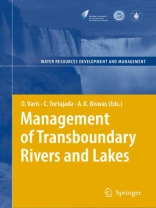Water’s role in the nature is very fundamental. As it circulates in the atmosphere, in the rivers, lakes, soil, rock, and in the oceans, it is the major conveyer of va- ous chemical substances and of energy, and it can also be called as the blood of the ecosystems of this planet. But at the same time water is interwoven in the va- ous functions of the nature and the human society in countless ways which makes water one of the most complicated challenges of the mankind today. These ch- lenges call for seeing water in a broad development framework, pressed by a mix of demographic, social, environmental, technological and economic drivers. Human beings are exploiting and enjoying, but at the same time polluting and deteriorating, the waters in various ways and water is equally important to the – man socio-economic system as it is to the nature. It may sound a bit anecdotal to say that water obeys no borders, but that is true; the hydrologic cycle with its r- ers, river basins, lakes, aquifers, rainfalls, oceans, etc., cross administrational b- ders without any passport control. River and lake basins are in most cases very different from the administrational borders that the human beings have set up.
Table des matières
Management of Transboundary Waters: An Overview.- The Southern African Hydropolitical Complex.- Okavango River Basin.- Water Management in the Jordan River Basin: Towards an Ecosystem Approach.- Transboundary Cooperation Between Finland and Its Neighbouring Countries.- Management of Ganges-Brahmaputra-Meghna System: Way Forward.- Indus Waters and the 1960 Treaty Between India and Pakistan.- The Mekong: IWRM and Institutions.- The Upstream Superpower: China’s International Rivers.- Management of the North American Great Lakes.- The Rio de la Plata River Basin: The Path Towards Basin Institutions.












